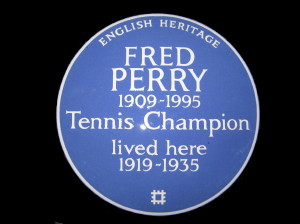To be unveiled by his grandson at former Pisthanger home
Sporting champion and tennis great, Fred Perry (1909 – 1995), is to be commemorated with an English Heritage blue plaque at 223 Pitshanger Lane, Ealing, his home during his Wimbledon triumphs.
John Barrett, tennis commentator and close friend of Fred Perry, will speak at the ceremony and the plaque will be unveiled by his grandson, John Frederick Perry, on Friday 15th June, 10.30am.
Penny Perry, Fred Perry’s daughter, said:
"This is a great honour and it seems so appropriate that the occasion is taking place during the English summer tennis season, in a Royal Jubilee year that is hosting the Olympics.
''All of these things would have thrilled Fred because no matter where he was in the world, he always considered himself to be grass roots English.
''This house was the base of opposing emotions in his life lessons with the sadness of loss and the elation of success. It was also from here that many of the friendships were formed that would last Fred his entire lifetime and he would be extremely proud today."
Although a northerner by birth, Perry’s formative years were spent in Ealing. The house and environs of Pitshanger Lane in particular were crucial to his development as a winning athlete. At home, Perry practised table tennis on the kitchen table, pushed up against a wall, and honed his tennis shots in the garden, against the wall or the garage door.
Later, when commuting to his office job with the Co-op, Perry remembered he “used to continue practising my tennis strokes with the aid of my umbrella on the twenty minutes walk to Ealing Broadway Station, clipping the tops of hedges and flowers when nobody was looking”.
Perry played the game for real at the Brentham Institute (now the Brentham Club) in Meadvale Road, just a few streets away; he relished the opportunities the club offered for other sports too, as well as games and parties. “It was paradise”, he later recalled. An early taste of sporting triumph came in August 1923, when he won a three-legged race there with Charles Redding, later a successful actor and director.
Fred Perry is the most successful male tennis player that Britain has ever produced, and one of the country’s few outstanding champions in any sporting discipline. Great Britain has not won the Davis Cup since his era, and he remains the last British man to win a “grand slam” event.
Perry’s victories were achieved by a steely determination that was not conducive to universal popularity. Dan Maskell, his tennis coach and friend, called him “a stubborn and sometimes truculent character who believed totally in his own ability”.
In 1950, with the businessman Theodore “Tibby” Wegner, Perry founded Fred Perry Sportswear. The branded sweatbands, shirts and other articles of clothing became a global success, both as sports and fashionable apparel.
Fred Perry published his autobiography in 1984, and in the same year a statue was unveiled at Wimbledon along with the renaming of the gates on Somerset Road to Fred Perry Gates.
Latterly, his knowledge of tennis and neat turn of phrase made him much in demand as a commentator and journalist; it was after attending the Australian Open that Perry died, on 2 February 1995. His funeral was held at Rottingdean, Sussex, which had been his base in England for many years and a memorial service was held in his honour at St. Paul’s Cathedral in London.
Howard Spencer, blue plaques historian at English Heritage, said: “Fred Perry dominated men’s tennis in a way no British player has done so since. Less well appreciated is the extent to which he outshone his predecessors too; when he won Wimbledon, he was the first British man to do so for twenty-five years. The plaque to Perry will remind people of his achievements, hopefully inspire others, and serve to connect him with the house that is so closely linked to his Wimbledon victories.”
12th June 2012
